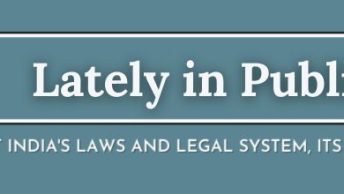A fortnightly feature inspired by I-CONnect’s weekly “What’s New in Public Law” feature that addresses the lacuna of a one-stop-shop public law newsletter in the Indian legal space.
What’s new at LAOT
1. Sarthak Sahoo, Judicial Discrimination and Intellectual Bias as a Ground for Judicial Recusal – A Response (argues against Anshul Dalmia’s proposal of instituting ‘intellectual bias’ as a ground for recusal for repeating judges in references to larger benches and provides a rebuttal to the four practical reasons posited by the author for the rule, concluding with a critique of the concept of intellectual bias as a form of bias in principle)
2. Arjun Maheshwari and Samarth Varshney, Breaking the Conventional Chains of Statehood Through Blockchain: Exploring States in Virtual Reality (reviews literature to argue that the scope of statehood under Article 1 of the Montevideo Convention of 1933 is broad enough to include cyber nations and should be adapted to be more flexible over time)
3. Samik Basu, Re-evaluating Section 24: Imagining RTI Disclosures Beyond ‘Corruption’ and ‘Human Rights Violations’ – Part I (argues that under the Right to Information Act, exemptions for organizations like the CBI, which only allow disclosures in cases of human rights violations or corruption, are inadequate and do not provide meaningful protection to citizens, suggesting the need for a broader standard)
4. Samik Basu, Re-evaluating Section 24: Imagining RTI Disclosures Beyond ‘Corruption’ and ‘Human Rights Violations’ – Part II (builds on Part I by arguing that Section 24 of the RTI Act violates Article 14 and proposes a new “public interest” standard for evaluating whether organizations should be mandated to disclose information)
Elsewhere Online
1. Uday Shankar, Oath: A Form of Constitutional Guidance to Resolve the Deadlock in the National Capital Territory of Delhi, IACL-AIDC Blog.
2. Abhinav Sekhri, BNSS Repeal and Savings – Initial Views, The Proof of Guilt Blog.
3. Aditya Danturty, From the Frying Pan into the Fire- Writ Jurisprudence vis-a-vis Social Media Intermediaries, The RMLNLU Law Review Blog.
4. Gautam Bhatia, Bail Conditions and Constitutional Rights, Indian Constitutional Law and Philosophy.
5. Abhinav Sekhri, A Landmark Judgement From J&K, In The Law’s Perennial Conflict Between Liberty & Security, Article-14.
6. Sanvi Raghuwanshi and Ishita Rajput, Unraveling the Chief Election Commissioner and the Other Election Commissioners Act, 2023: Implication and Challenges, Constitutional Law Society of National Law University Odisha.
Lately in Academic Article
1. Himanshu Shrivastava & Sabeeh Akhter, A Comparative Study of the Indian Penal Code and the Bharatiya Nyaya Sanhita’s Gender-related Provisions, Statute Law Review (analyzes changes introduced in the Bharatiya Nyaya Sanhita of 2023 relating to gender-based offenses and compares them to the Indian Penal Code of 1860, assessing the potential to address gender inequalities and emphasizing the importance of recognizing and protecting LGBTQIA+ rights within the legal framework).
2. Shree Agnihotri, Interpreting without bannisters? The abstraction problem afflicting the basic structure doctrine, Taylor & Francis Online (argues that despite the evolving scope of the Basic Structure Doctrine, it suffers from an abstraction problem, proposing a “stratification test” to categorize these features and improve constitutional dialogue and governance).
3. Chhaya Bhardwaj & Daniel Stein, Held v State of Montana: Environmental constitutionalism in the US and its comparison with India, Jindal Global Law Review (analyzes the Montana State Court decision in Held v State of Montana (2023) through the lens of climate and environmental constitutionalism, comparing it to the Indian context and suggesting that this case may inspire climate constitutionalism in India).
4. Shashank Pandey, Debadityo Sinha, The Green Hour Vol. 2 Issue I: Winter Session 2023 & Interim Budget Session 2024, Vidhi Centre for Legal Policy (covers parliamentary proceedings on environmental matters during Winter Session 2023 and Interim Budget Session 2024, including questions to the Ministry of Environment, Forest and Climate Change and their responses, thematic distribution, and geographical representation of MPs).
5. Madhav Khosla & Milan Vaishnav, Democracy and defections, International Journal of Constitutional Law (examines anti-defection laws in parliamentary systems, focusing on India’s extensive experiment and its impact on accountability and representation, and compares similar laws in Israel and South Africa, suggesting that legislating party unity may necessitate reevaluating legislatures, political parties, and polarization).
Listen Up
1. All Things Policy, Who Killed the Fundamental Right to Property in India? (explores the historical and legal context behind the abrogation of the fundamental right to property in India).
2. Dr. Penny Crofts and Dr. Honni van Rijswijk, Exploring Law and Feminism Through Horror by Feminist Law Podcast (discuss the intersection of law, feminism, and horror and how these fields can provide unique insights into societal issues).
3. Varuni Sinha, Golden Handcuffs: Varuni’s Testimony of Women’s Experiences of Immigration Law (part 1 and part 2), by Feminist Law Podcast (examines the challenges women face under immigration law through the personal testimony of Varuni Sinha).
Opportunities and Other thing
1. Call for Participation in the International Conference on Data, Knowledge, Wisdom & Law by NUJS, Kolkata. The last date for submission of the abstract is 15 August 2024.
2. Call for Papers for the 2nd NLUJ-Indus Law Corporate Law Review Summit, 2024. The last date for submission is 18 August 2024.
3. Call for Chapters for an Edited Book titled Justice Dispensation in India by NLU Delhi. The last date to submit abstracts is 25 August 2024.
4. Call for Papers for the Indian Law Review by NLIU Bhopal. The last date for submission is 31 September 2024.
5. Call for Papers for the Conference on Reforms in Criminal Laws: Past, Present and Future by RGNUL. The last date for submission of abstracts is 15 October 2024.
6. Call for Papers for the Journal on Labour by CLLRA, NLU Delhi. The last date for submission is 30 November 2024.
This initiative was started by the Law and Other Things Student Team with the guidance of Surbhi Karwa.





[…] Posted byLAOT Team […]